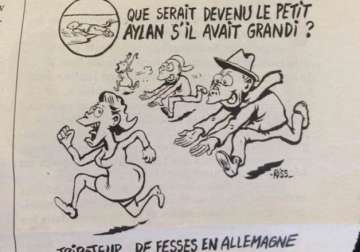Charlie Hebdo cartoon depicts dead Syrian toddler as a 'groper', draws ire
A year after it faced a ghastly terror attack that left eight of its staff, two policemen and two other men dead on January 7, 2015, French satirical magazine Charlie Hebdo is back in the news.

A year after it faced a ghastly terror attack that left eight of its staff, two policemen and two other men dead on January 7, 2015, French satirical magazine Charlie Hebdo is back in the news. The reactions to this issue of the controversial publication, however, are far from the support and sympathy it has received over the past one year.
The controversial publication has always been in the news for it's over the top cartoons and a provocative brand of humour. This time though, it may have taken things too far for the liking of many of its supporters. The latest issue of the magazine carried a cartoon that depicts Alan Kurdi – the three-year-old Syrian toddler whose death triggered a wave of sympathy for the war-torn migrants – as growing up in Germany and turning into a sexual molester.
Aylan drowned along with his brother and mother on September 2 when the boat they were travelling from the Greek island of Kos to the Turkish town of Bodrum capsized. The family fled after Islamic State militants advanced upon their home town of Kobane.
Also Read: Now, Charlie Hebdo under fire for dead Syrian toddler's cartoon
The cartoon, which has been drawn by the magazine's acting Editor Laurent "Riss" Sourisseau – who was present at the Charlie Hebdo office att he day of the attack – portrays two men running after a terrified woman with their arms stretched out. The cartoon is titled, "Migrants," and the cartoon's text reads: "What would little Aylan have grown up to be? (A) groper in Germany."
Inset is a rendering of the famous picture of Alan lying face down on a Turkish beach. The photograph soon came to be a symbol of sympathy for the migrants who were fleeing their war-torn countries to seek refuge on safer ground. However, recent incidents of molestation and robbing of women during the New Years revelry in Cologne by men appearing to be Africans or Arabs has turned the sentiment against them. The scale of the Cologne assaults has shocked world and put a spotlight on the 1.1 million asylum seekers who arrived in the country last year.
The cartoon has drawn severe criticism from critics and on social media platforms, with users dubbing it as offensive and racist. "This disgustingly racist Charlie Hebdo cartoon makes me question 'Je suis Charlie' in its entirety," tweeted Australian journalist Ebony Bowden.
"I wonder how many lovers Charlie Hebdo has now?" tweeted George Galloway, a former British MP and London mayoral candidate. "A disgusting racist Islamophic cartoon of little Aylan Kurdi later..."
Mina Al-Oraibi, an Iraqi journalist based in London, tweeted: "Charlie Hebdo latest racist cartoon dishonouring memory of poor Alan Kurdi is unforgivable."
However, the publication has some support in people like Maajid Nawaz, chairman of London-based counter-extremism think tank Quilliam, who argued in Facebook posts that the critics had missed the point of the cartoon.
The cartoon, he argued, only brought to fore the European anti-migrant attitude. "Taste is always in the eye of the beholder," he wrote. "But these cartoons are a damning indictment on our anti-refugee sentiment."
Islamic terrorists stormed the Paris office of Charlie Hebdo killing 12 in response to the Charlie Hebdo's publications of images of Islam's central prophet, Mohammed, of whom Islam strictly prohibits depictions. Following the attack on its office a year ago, Charlie Hebdo became one of the best-known publications in the world and the hashtag #JeSuisCharlie flashed across social networks.
The magazine soon became a global icon for freedom of speech. The first issue brought out by the surviving staff sold a record 7.5 million copies. This development came amid reports that it was virtually on the verge of being shut down about a month before the attack.